International Relations - Current Affairs for December, 2017
International Relations Current Affairs for December, 2017
Month wise coverage of International Relations Current Affairs helps you improve your general knowledge and prepare for all competitive exams like IBPS, Bank PO, SBI PO, RRB, RBI, LIC, Specialist Officer, Clerk, SSC, UPSC, Railway etc. This section is updated daily with the most important events.Preparing International Relations Current Affairs December, 2017
1. Read the most important International Relations Current affairs and facts here. 2. Take practice test of our International Relations MCQ and Objective type questions. 3. Clear any quiz, GK, job interview or competitive exam on current affairs.
- Month & Year
▼ India, Morocco sign health agreement [12-15-17]
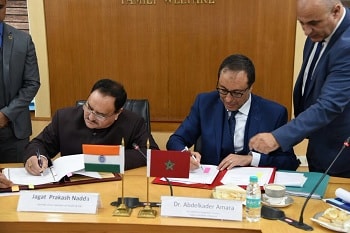 India and Morocco signed a Memorandum of Understanding (MoU) for enhanced cooperation in the health sector.
Shri J P Nadda mentioned that both the countries share a strong and rich traditional relationship.
India is producer of quality generic medicines and drugs that are exported to more than 200 countries and has a strong and robust public health system monitored through National Health Mission.
Via this framework MOU between two countries, both the countries can work together in identified areas of cooperation as both countries have much to offer to each other in the field of health.
The main areas of cooperation include the following: India and Morocco signed a Memorandum of Understanding (MoU) for enhanced cooperation in the health sector.
Shri J P Nadda mentioned that both the countries share a strong and rich traditional relationship.
India is producer of quality generic medicines and drugs that are exported to more than 200 countries and has a strong and robust public health system monitored through National Health Mission.
Via this framework MOU between two countries, both the countries can work together in identified areas of cooperation as both countries have much to offer to each other in the field of health.
The main areas of cooperation include the following:
- Non-communicable diseases, including child cardiovascular diseases and cancer;
- Drug Regulation and Pharmaceutical quality control;
- Communicable Diseases;
- Maternal, child and neonatal health;
- Hospital twinning for exchange of good practices and
- Training in administration and management of health services and Hospitals
Another MoU was signed between Jawaharlal Institute of Post Graduate Medical Education and Research (JIPMER), Puducherry and Marrakech Mohamed VI University Hospital, Morocco in the presence of both the Ministers.
Under this MoU both the Institutes agreed to collaborate in the field of telemedicine.
The focus areas under this MoU will be Tele-Health Care, Health Education, technical support in controlling epidemics and support in rendering second opinion on various complicated cases.
|
▼ Sri Lanka hands over Hambantota port for 99 year lease [12-14-17]
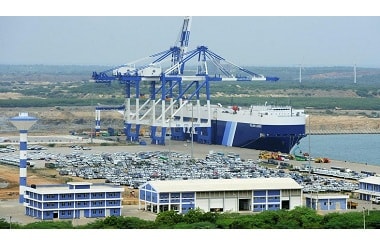 Sri Lanka has formally handed over its southern strategic port of Hambantota to China on 99-year lease.
Two Chinese firms managed by China Merchants Port Holdings Company (CMPort) and Sri Lanka Ports Authority will own port and the investment zone around it.
Hambantota port is strategically located right in middle of vital energy supply lines in Indian Ocean, connecting Middle East and East Asia.
It had gained strategic significance after Sri Lankan government had decided to build massive deep-sea port and airport with huge Chinese loans.
Background
The Sri Lankan government had signed a $1.1 billion deal in July 2017 to sell a 70% stake in Hambantota port to China.
Under the 99-year lease agreement, Sri Lanka received $300 million as initial payment. The deal was signed after port suffered heavy losses, making it impossible for Sri Lanka to repay its debts to China which was used to open Hambantota port in 2011.
Significance of Hambantota Port Sri Lanka has formally handed over its southern strategic port of Hambantota to China on 99-year lease.
Two Chinese firms managed by China Merchants Port Holdings Company (CMPort) and Sri Lanka Ports Authority will own port and the investment zone around it.
Hambantota port is strategically located right in middle of vital energy supply lines in Indian Ocean, connecting Middle East and East Asia.
It had gained strategic significance after Sri Lankan government had decided to build massive deep-sea port and airport with huge Chinese loans.
Background
The Sri Lankan government had signed a $1.1 billion deal in July 2017 to sell a 70% stake in Hambantota port to China.
Under the 99-year lease agreement, Sri Lanka received $300 million as initial payment. The deal was signed after port suffered heavy losses, making it impossible for Sri Lanka to repay its debts to China which was used to open Hambantota port in 2011.
Significance of Hambantota Port
- For China, Hambantota port is crowning glory of its One Belt One Road project, which aims to build new Silk Road of trade routes between China and more than 60 countries in Asia, Africa, Middle East and Europe.
- That project is underpinned by network of harbours across world that has put China in position to challenge US as the world's most important maritime superpower.
- Other similar developments in region include Gwadar port in Pakistan, which is centrepiece of $55 billion China-Pakistan Economic Corridor (CPEC).
- India is apprehensive that the port is part of Chinese 'string of pearls' with an objective to surround India and dock its military vessels.
- The String of pearls is a geopolitical theory on potential Chinese intentions in the Indian Ocean region.
|
▼ India plans to extend India-Myanmar-Thailand highway [12-14-17]
 India is planning to hold talks with Association of Southeast Asian Nations (ASEAN) countries to extend India-Myanmar-Thailand (IMT) highway up to Vietnam.
As per proposals from India, the 1,360 km long IMT highway from Moreh in India to Mae-Sot in Thailand can be extended to Vietnam via Laos and Cambodia.
The connectivity provided by expansion of IMT highway till Vietnam can generate an estimated $70 billion annually in incremental GDP and $20 million in incremental aggregate employment by 2025.
Besides, it will provide much required market for crops grown in hilly regions of Northeast India, thus benefiting growers in getting better price for their produce.
Besides, Government is also working to connect India with South East Asia is IMT Motor Vehicle Agreement (IMT MVA).
India, Myanmar and Thailand had commenced negotiations for finalising and implementing IMT MVA in 2014 to utilise physical road infrastructure on IMT Trilateral Highway.
India-Myanmar-Thailand (IMT) highway India is planning to hold talks with Association of Southeast Asian Nations (ASEAN) countries to extend India-Myanmar-Thailand (IMT) highway up to Vietnam.
As per proposals from India, the 1,360 km long IMT highway from Moreh in India to Mae-Sot in Thailand can be extended to Vietnam via Laos and Cambodia.
The connectivity provided by expansion of IMT highway till Vietnam can generate an estimated $70 billion annually in incremental GDP and $20 million in incremental aggregate employment by 2025.
Besides, it will provide much required market for crops grown in hilly regions of Northeast India, thus benefiting growers in getting better price for their produce.
Besides, Government is also working to connect India with South East Asia is IMT Motor Vehicle Agreement (IMT MVA).
India, Myanmar and Thailand had commenced negotiations for finalising and implementing IMT MVA in 2014 to utilise physical road infrastructure on IMT Trilateral Highway.
India-Myanmar-Thailand (IMT) highway
- The India-Myanmar-Thailand Trilateral Highway is highway under construction under India's Act East policy that will connect Moreh, India with Mae Sot, Thailand via Myanmar.
- The highway is expected to boost trade and commerce in ASEAN-India Free Trade Area, as well as with rest of Southeast Asia.
|
▼ India-Cuba MoU on cooperation in health sector [12-7-17]
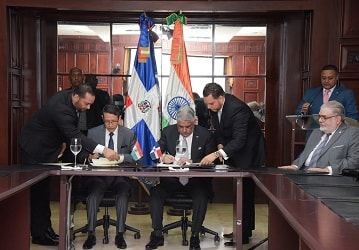 India and Cuba signed a Memorandum of Understanding (MoU) for enhanced cooperation in the health sector, on Dec 6, 2017.
MOU on cooperation in the field of health and medicine between India and Cuba is important for exchanges in the health sector and to develop institutional framework for cooperation in the health sector between the two countries.
One potential area is pharmaceutical and biotechnology. Cuba has made remarkable strides in the field of bio-technology and pharmaceuticals.
The objective of this MoU is to establish comprehensive inter-ministerial and inter-institutional cooperation between the two countries in the field of health by pooling technical, scientific, financial and human resources with the ultimate goal of upgrading the quality and reach of human, material and infrastructural resources involved in health care, medical education & training, and research in both countries.
Main Areas of India-Cuba health MoU cooperation
The main areas of cooperation include: India and Cuba signed a Memorandum of Understanding (MoU) for enhanced cooperation in the health sector, on Dec 6, 2017.
MOU on cooperation in the field of health and medicine between India and Cuba is important for exchanges in the health sector and to develop institutional framework for cooperation in the health sector between the two countries.
One potential area is pharmaceutical and biotechnology. Cuba has made remarkable strides in the field of bio-technology and pharmaceuticals.
The objective of this MoU is to establish comprehensive inter-ministerial and inter-institutional cooperation between the two countries in the field of health by pooling technical, scientific, financial and human resources with the ultimate goal of upgrading the quality and reach of human, material and infrastructural resources involved in health care, medical education & training, and research in both countries.
Main Areas of India-Cuba health MoU cooperation
The main areas of cooperation include:
- Exchange & training of medical doctors, officials, other health professionals and experts
- Assistance in development of human resources, health services and setting up of health care facilities
- Short term training of human resources in health
- Regulation of pharmaceuticals, medical devices and exchange of information;
- Promotion of business development opportunities in pharmaceuticals and others identified by parties
- Procurement of generic and essential drugs and assistance in sourcing of drug supplies;
- Procurement of health equipment and pharmaceutical products;
- Any other area of cooperation as may be mutually decided upon.
- Procurement of health equipment and pharmaceutical products;
- Collaboration in the prevention of NCDs of mutual interest, such as neurocardiovascular diseases, cancer, COPDs, mental health and dementia, with an emphasis on SDG3 and related factors;
- Collaboration in the field of climate change impact on communicable diseases and vector borne diseases;
- Nutritional aspects of food intake, including malnutrition (over-nutrition and under-nutrition) in the light of the SDG2 and organization of nutritional services;
- Safety of production, transformation, distribution and food delivery;
- Research and training of food industry operators;
- Information and communication to citizens on hygiene and food safety and healthy eating habits;
|
▼ IMO re-elects India [12-4-17]
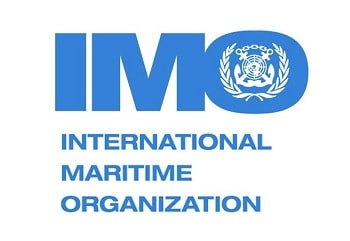 India was re-elected to Council of the International Maritime Organisation (IMO) at an assembly of body at its headquarters in London.
India was elected under category B that represents nations with largest interests in international sea borne trade. It secured second-highest 144 number of votes from member-countries, just after Germany's 146. India was re-elected to Council of the International Maritime Organisation (IMO) at an assembly of body at its headquarters in London.
India was elected under category B that represents nations with largest interests in international sea borne trade. It secured second-highest 144 number of votes from member-countries, just after Germany's 146.
|
▼ India Netherlands bilateral APA [12-4-17]
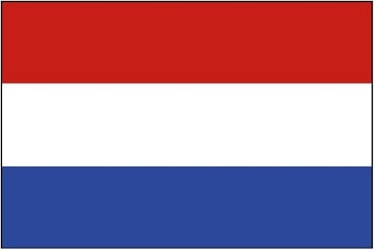 These two APAs pertain to Electronics and Technology sectors of economy. It also covers international transactions that include Distribution, Provision of Business Support Services, Provision of Marketing Support Services etc.
With this, the total number of APAs entered into by CBDT has gone up to 186. This includes 171 Unilateral APAs and 15 Bilateral APAs. These two APAs pertain to Electronics and Technology sectors of economy. It also covers international transactions that include Distribution, Provision of Business Support Services, Provision of Marketing Support Services etc.
With this, the total number of APAs entered into by CBDT has gone up to 186. This includes 171 Unilateral APAs and 15 Bilateral APAs.
|
▼ India and Singapore sign agreement for naval cooperation [12-1-17]
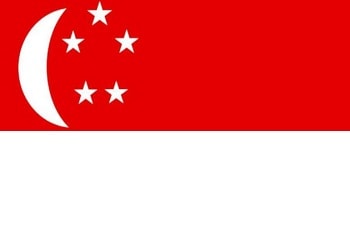 India and Singapore have signed Bilateral Agreement for Navy Cooperation that will allow Indian Navy ships logistical support, including refuelling at Singapore's Changi Naval Base located near disputed South China Sea (SCS).
The agreement was announced during second Defence Ministers' Dialogue between India and Singapore held in New Delhi.
The Bilateral Agreement for Navy Cooperation will allow Indian Navy ships sailing through disputed SCS or in eastern waters of Andaman Sea to refuel, restock and if needed rearm at Singapore's Changi naval base. It will allow Indian Navy to directly engage with Singaporean authorities to use their facilities unlike present structure that take weeks if political clearances need to be obtained in Singapore. India and Singapore have signed Bilateral Agreement for Navy Cooperation that will allow Indian Navy ships logistical support, including refuelling at Singapore's Changi Naval Base located near disputed South China Sea (SCS).
The agreement was announced during second Defence Ministers' Dialogue between India and Singapore held in New Delhi.
The Bilateral Agreement for Navy Cooperation will allow Indian Navy ships sailing through disputed SCS or in eastern waters of Andaman Sea to refuel, restock and if needed rearm at Singapore's Changi naval base. It will allow Indian Navy to directly engage with Singaporean authorities to use their facilities unlike present structure that take weeks if political clearances need to be obtained in Singapore.
|